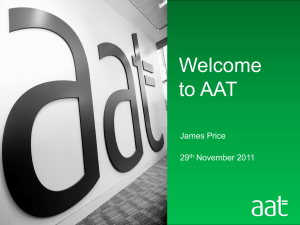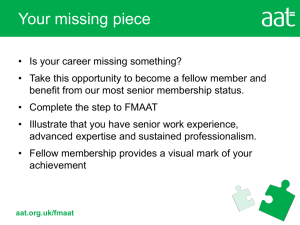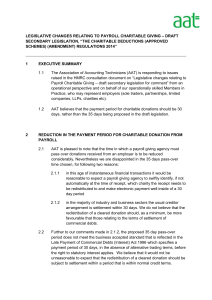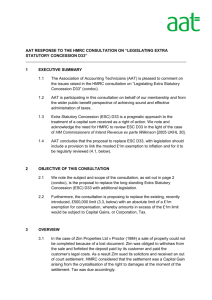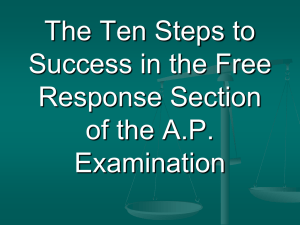Extra statutory concessions
advertisement
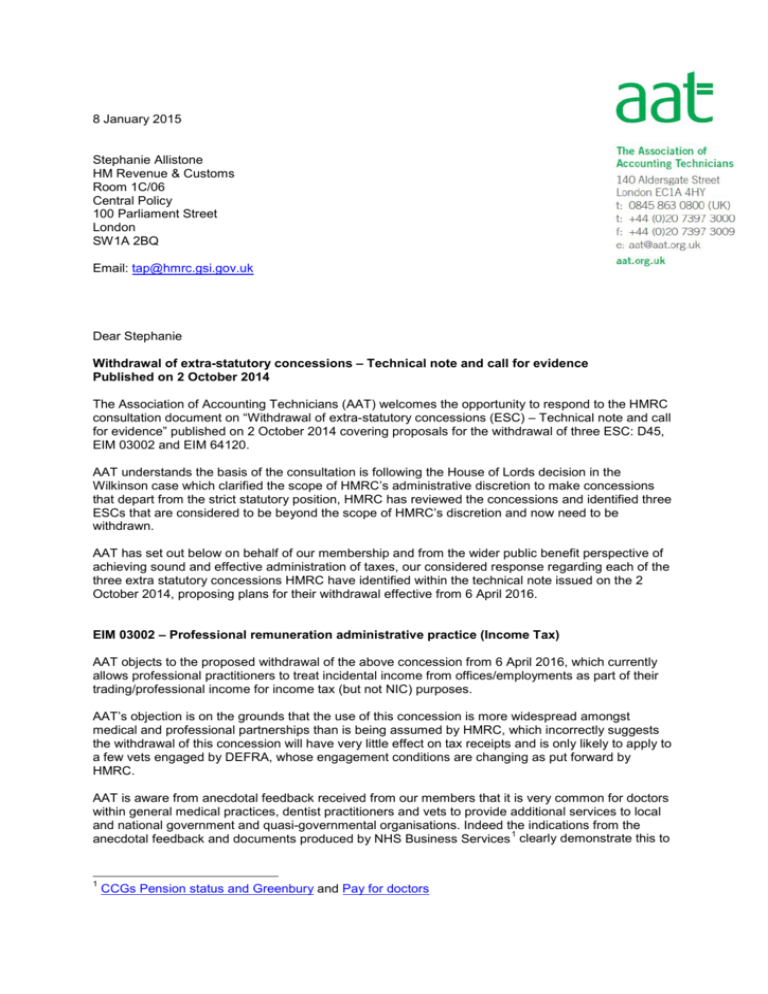
8 January 2015 Stephanie Allistone HM Revenue & Customs Room 1C/06 Central Policy 100 Parliament Street London SW1A 2BQ Email: tap@hmrc.gsi.gov.uk Dear Stephanie Withdrawal of extra-statutory concessions – Technical note and call for evidence Published on 2 October 2014 The Association of Accounting Technicians (AAT) welcomes the opportunity to respond to the HMRC consultation document on “Withdrawal of extra-statutory concessions (ESC) – Technical note and call for evidence” published on 2 October 2014 covering proposals for the withdrawal of three ESC: D45, EIM 03002 and EIM 64120. AAT understands the basis of the consultation is following the House of Lords decision in the Wilkinson case which clarified the scope of HMRC’s administrative discretion to make concessions that depart from the strict statutory position, HMRC has reviewed the concessions and identified three ESCs that are considered to be beyond the scope of HMRC’s discretion and now need to be withdrawn. AAT has set out below on behalf of our membership and from the wider public benefit perspective of achieving sound and effective administration of taxes, our considered response regarding each of the three extra statutory concessions HMRC have identified within the technical note issued on the 2 October 2014, proposing plans for their withdrawal effective from 6 April 2016. EIM 03002 – Professional remuneration administrative practice (Income Tax) AAT objects to the proposed withdrawal of the above concession from 6 April 2016, which currently allows professional practitioners to treat incidental income from offices/employments as part of their trading/professional income for income tax (but not NIC) purposes. AAT’s objection is on the grounds that the use of this concession is more widespread amongst medical and professional partnerships than is being assumed by HMRC, which incorrectly suggests the withdrawal of this concession will have very little effect on tax receipts and is only likely to apply to a few vets engaged by DEFRA, whose engagement conditions are changing as put forward by HMRC. AAT is aware from anecdotal feedback received from our members that it is very common for doctors within general medical practices, dentist practitioners and vets to provide additional services to local and national government and quasi-governmental organisations. Indeed the indications from the 1 anecdotal feedback and documents produced by NHS Business Services clearly demonstrate this to 1 CCGs Pension status and Greenbury and Pay for doctors be the case, underlining the current practice and use of this concession. AAT therefore believes that there is an ongoing need for this concession. AAT also understands that other professional partnerships may undertake similar engagements for other organisations on a smaller scale such as a partner(s) in surveyor partnerships working for local councils or a partner(s) in a firm of solicitors acting as tribunal judges or as the chair/lay member on 2 NHS Clinical Commissioning Group’s (CCG) Hospital boards . Notably within the medical sector CCG’s would be one of the main bodies commissioning the additional services of general medical practitioners for the support of a range of health services in the local community. 3 This has resulted in a number of these CCG’s issuing their own guidance in respect of the appointment of outside medical practitioners who would normally have the legal status of “Office Holder” for the CCG. As a consequence this should mean such individuals are not considered to be employees of the organisation to which they provide additional clinical services. Furthermore, AAT understands that the CCG’s have also instigated gross payment systems for the processing of remuneration claims for these individuals with NT codes under the concession EIM 03002. AAT considers that HMRC should be in a position to collate the total number of NT codes approved in connection with the use of the above concession by general medical practitioners and from this information establish a better understanding of the current use of this concession within the medical sector. The time spent by practitioners providing additional clinical services with the income received from this work being small compared to the main income of an affected practice. Treating such additional income as employment income would lead to an unwanted additional administration burden through the imposition of a requirement to account for PAYE in the medical practitioner’s drawings. Under the existing concession (see, EIM 03002) it is possible for such income to be treated as trading income within the general medical practitioners’ practice accounts. This approach enables a gross payment to be processed without the need for deduction of PAYE through the use of an NT code received from HMRC. In order to avail themselves of the approach described above the general medical practitioner would need to apply to HMRC under statutory concession ESC A37. HMRC, if satisfied the required conditions have been met, would then issue an NT code. Subsequent to the codes issuance the gross income payments could then be paid directly into the partnership’s bank account. Such income payments would then be treated as “pooled” income of the recipient practice. In addition to the above; the removal of the concession would, also, impact on the calculation of profits disclosed on the general medical practitioner’s superannuation certificate. The superannuation certificate and its guidance notes are prepared by NHS Pensions and are used to calculate the general medical practitioner’s pensionable profits and pension contributions payable. There are currently two methods of calculating these profits, the first is the “statutory method” and the second is the “concessionary method”. The latter uses the concession that it is proposed to withdraw in order to calculate a practitioners’ superannuation. Therefore, the withdrawal of the concession would adversely impact on the practitioner’s future pension entitlement. AAT’s view is that this is a valued and well used concession and one that AAT would very much wish to see maintained. The continuation of this concession would also remove the need for the introduction of a new limited concession currently being negotiated with DEFRA by HMRC. 2 3 Options for engaging members of the CCG governing body Google search of “clinical commissioning groups office holders guidance” and GP Sessional Working In the light of the points that we have made in our response to the proposed withdrawal of the ESC AAT recommends that further evaluation on the impact of removing this concession should be undertaken before a final decision is taken. EIM 64120 – Sports Testimonials (Income Tax) AAT acknowledges that the taxation of income arising from sports testimonials has been a matter for some discussion since the 1920s, largely from guidance based on the 1927 decision of the House of Lords in Reed (HMIT) v Seymour and subsequent cases. It is recognised that over this time the financial landscape in respect of the remuneration of professional sports persons has evolved considerably. It has to be recognised that the change in the rate of remuneration has not been uniform either within the same sporting discipline or when comparing one with another. In reality and in fairness to all taxpayers AAT considers testimonial proceeds to be derived from a sportsperson’s employment and as such the sums received should be taxable as general earnings in line with other voluntary payments by the public to employees. We would therefore not have any objection to the withdrawal of the ESC. In giving our support to the withdrawal of the concession AAT would not wish to see any impact on the good causes that testimonials have up until now benefited. We would expect that they would be excepted in legislation from any adverse impact. D45 – Capital Gains Tax: roll-over into depreciating assets (Capital Gains Tax) AAT agree as death is not a charge to tax (s.62 (1) (b) TCGA 1992), and gains rolled over into depreciating assets are brought into charge on the dates specified in s154 (2), if death is a cause of the cessation of trade and is the earlier of the time limits specified in s154 (2), then the rolled over gain cannot be brought into charge. Therefore AAT would have no objections to the withdrawal of ESC D45 as any gains are already exempted by the existing legislation thereby removing the need for this concession. About the AAT AAT is a professional accountancy body with over 49,800 full and fellow members and 87,700 student and affiliate members worldwide. Of the full and fellow members, there are 4,100 Members in Practice who provide accountancy and taxation services to individuals, not-for-profit organisations and the full range of business types (figures correct as at 30 November 2014). AAT is a registered charity whose objectives are to advance public education and promote the study of the practice, theory and techniques of accountancy and the prevention of crime and promotion of the sound administration of the law. Thank you for the opportunity to respond to the HMRC consultation document; extra statutory concessions: withdrawal of three extra statutory concessions. Further engagement If you have any questions or would like to discuss any of the points in more detail then please contact the AAT at: email: consultation@aat.org.uk and aat@palmerco.co.uk telephone: 020 7397 3088 Aleem Islan Association of Accounting Technicians 140 Aldersgate Street London EC1A 4HY Yours sincerely Adam Harper Director of Professional Development t: +44 (0) 20 7397 3075 f: +44 (0) 20 7397 3009 e: adam.harper@aat.org.uk
